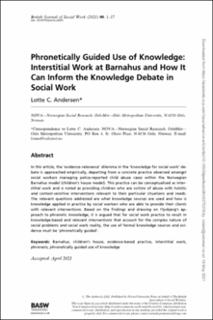Phronetically Guided Use of Knowledge: Interstitial Work at Barnahus and How It Can Inform the Knowledge Debate in Social Work
Peer reviewed, Journal article
Published version
Permanent lenke
https://hdl.handle.net/11250/2781423Utgivelsesdato
2021-05-13Metadata
Vis full innførselSamlinger
Sammendrag
In this article, the ‘evidence–relevance’ dilemma in the ‘knowledge for social work’ debate is approached empirically, departing from a concrete practice observed amongst social workers managing police-reported child abuse cases within the Norwegian Barnahus model (children’s house model). This practice can be conceptualised as interstitial work and is noted as providing children who are victims of abuse with holistic and context-sensitive interventions relevant to their particular situations and needs. The relevant questions addressed are what knowledge sources are used and how is knowledge applied in practice by social workers who are able to provide their clients with relevant interventions. Based on the findings and drawing on Flyvbjerg’s approach to phronetic knowledge, it is argued that for social work practice to result in knowledge-based and relevant interventions that account for the complex nature of social problems and social work reality, the use of formal knowledge sources and evidence must be ‘phronetically guided’

